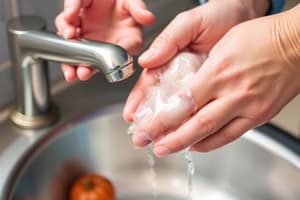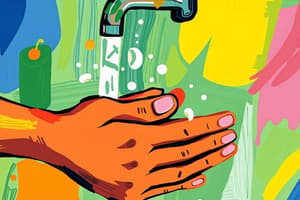Podcast
Questions and Answers
Which of the following statements is true? After touching raw ground beef, it is important to:
Which of the following statements is true? After touching raw ground beef, it is important to:
- Wipe your hands on a sanitizer wipe cloth
- Use hand sanitizer
- Dip your hands in a bucket of sanitizer
- Wash your hands (correct)
What is proper hand washing?
What is proper hand washing?
- Using soap, running water and scrubbing for 15-20 seconds (correct)
- Using soap, running water and scrubbing for 5-10 seconds
- Using sanitizer, running water and scrubbing for 15-20 seconds
- Using sanitizer, running water and scrubbing for 5-10 seconds
It is okay to wear disposable gloves if:
It is okay to wear disposable gloves if:
- You blow into the gloves first to make them easier to put on
- You wear a pair of gloves to handle money and food
- You wash your hands first and discard gloves between activities (correct)
- You discard the gloves every few hours or at least once a day
When you have a sore throat or diarrhea, you should:
When you have a sore throat or diarrhea, you should:
The most important reason to wash, rinse and sanitize cutting boards is to:
The most important reason to wash, rinse and sanitize cutting boards is to:
What is a substitute for proper hand washing?
What is a substitute for proper hand washing?
Where or when can you smoke and eat in the establishment?
Where or when can you smoke and eat in the establishment?
Cross-contamination is:
Cross-contamination is:
Which is the correct way to wash your hands?
Which is the correct way to wash your hands?
Washing your hands thoroughly and frequently is the most important thing a food service worker can do to keep germs out of the food he/she prepares. As a food service worker, it is important that you wash your hands:
Washing your hands thoroughly and frequently is the most important thing a food service worker can do to keep germs out of the food he/she prepares. As a food service worker, it is important that you wash your hands:
As you enter the kitchen to start your working day, what should you do before handling food?
As you enter the kitchen to start your working day, what should you do before handling food?
Why are all food service workers required to understand and apply food safety knowledge?
Why are all food service workers required to understand and apply food safety knowledge?
Germs can be spread from a food service worker. Which of the following is the best thing you can do as a food service worker to prevent spreading germs?
Germs can be spread from a food service worker. Which of the following is the best thing you can do as a food service worker to prevent spreading germs?
When you wear gloves, you must:
When you wear gloves, you must:
When must you wash your hands?
When must you wash your hands?
What should you do if the gloves you are using to handle food become contaminated?
What should you do if the gloves you are using to handle food become contaminated?
If you are sick with fever and diarrhea, you should:
If you are sick with fever and diarrhea, you should:
When using disposable gloves, how often do you need to change your gloves and/or wash your hands?
When using disposable gloves, how often do you need to change your gloves and/or wash your hands?
What are some of the food contact surfaces that must always be washed and sanitized?
What are some of the food contact surfaces that must always be washed and sanitized?
You notice your glove is torn; what should you do?
You notice your glove is torn; what should you do?
If you have a cut on your hand, you must:
If you have a cut on your hand, you must:
You can prevent food-borne illness by:
You can prevent food-borne illness by:
Washing your hands is required:
Washing your hands is required:
What is the most important thing you can do to keep harmful germs out of the foods you prepare?
What is the most important thing you can do to keep harmful germs out of the foods you prepare?
Flashcards are hidden until you start studying
Study Notes
Hand Washing and Hygiene
- Always wash hands after handling raw foods, such as ground beef, to prevent cross-contamination.
- Proper hand washing involves using soap and running water while scrubbing for 15-20 seconds.
- It is important to wash hands thoroughly before handling food each day, ensuring preparation surfaces are safe.
Gloves and Food Handling
- Disposable gloves are acceptable if hands are washed before usage and gloves are discarded between different tasks.
- Gloves should be changed whenever they become contaminated; this includes when you touch non-food surfaces.
- A torn glove must be replaced immediately after washing hands to maintain hygiene.
Illness Reporting
- Report illnesses such as sore throat or diarrhea to a supervisor instead of continuing to work.
- If experiencing fever and diarrhea, the correct action is to stay home and inform the employer of your condition.
Cross-Contamination and Food Safety
- Cross-contamination occurs when germs spread from one food to another, highlighting the importance of sanitary practices.
- Wash and sanitize cutting boards to prevent contamination between different food types.
Hand Washing Protocol
- Wash hands frequently after using the restroom, eating, or touching any contaminated surfaces.
- There is no substitute for thorough hand washing; hand sanitizers and gloves do not replace this critical practice.
Safe Food Preparation Practices
- Food contact surfaces like cutting boards and utensils must be washed and sanitized regularly to avoid food-borne illnesses.
- Maintain safe food handling techniques, including controlling food temperatures to prevent hazardous bacterial growth.
Personal Hygiene in the Workplace
- Every food service worker must understand food safety to prevent the spread of illnesses through food.
- Keep personal hygiene routines strict, including washing hands frequently, especially after touching one's face, mouth, or body.
Key Responsibilities for Food Service Workers
- Workers are responsible for ensuring cleanliness in the kitchen, which involves keeping floors, counters, and food preparation areas sanitary.
- If you notice any signs of contamination, such as a torn glove or cuts on hands, immediately take steps to rectify the situation by changing gloves or washing hands.
Importance of Compliance
- Following these practices is crucial for maintaining food safety standards and preventing food-borne illnesses, ensuring the health of both workers and customers.
Studying That Suits You
Use AI to generate personalized quizzes and flashcards to suit your learning preferences.




